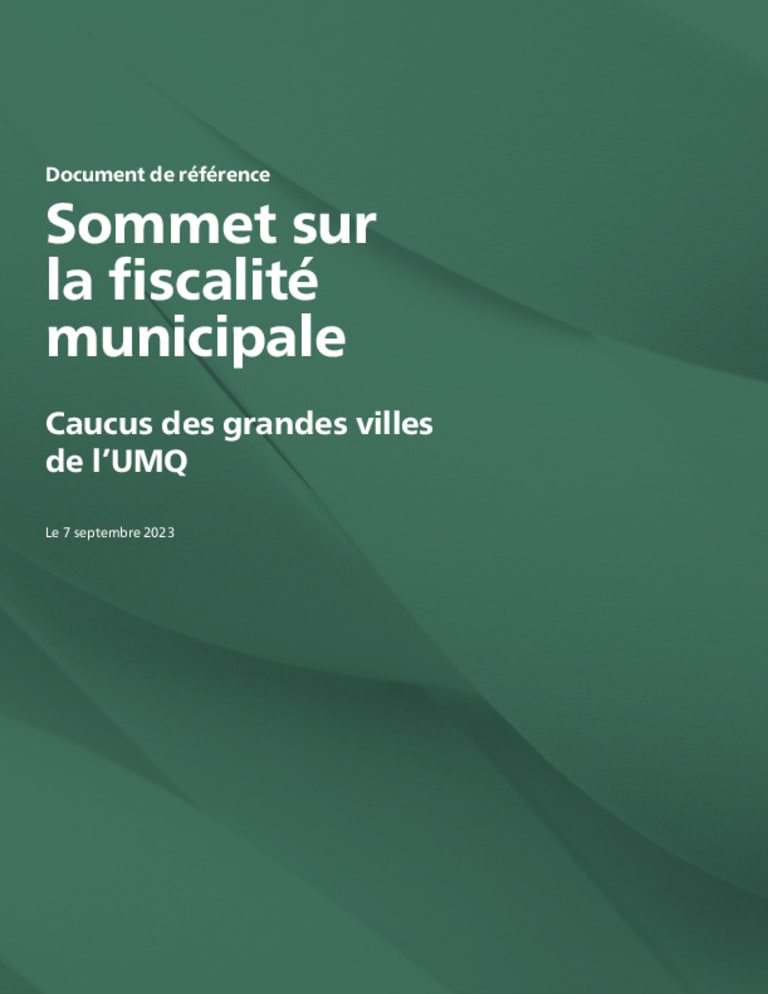Municipal taxation: Diversifying city funding
How can Montréal vary its sources of revenue and make its ambitions tangible in a way that is aligned with the population’s ability to pay? This dialogue around taxation in Montreal aims to find solutions for funding city activities other than property taxes.
At a time when towns and cities’ expenditures are soaring, Montréal is taking action to make sure there is stable, sufficient and recurrent funding for municipal services without passing the bill to future generations.
The purpose of the following initiatives is to set a new taxation and budgetary framework.
Municipal Taxation Summit
Date: September 7, 2023
The event will bring together representatives of Québec’s 11 largest cities and numerous partners from the municipal sector and civil society. Montréal and other Québec agglomerations face similar challenges and responsibilities, particularly in terms of ecological transition, housing, mobility and the fight against social inequalities.
The aim is to identify solutions and opportunities that will enable cities to play their full role in a tight budgetary context.
The summit will help the city create a road map to renegotiate the 2024 fiscal pact with the provincial government.
Documents
Taxation expert committee
Entry into service: April 2023
Mission: To help the city reflect on municipal taxation and recommend possible solutions
Committee members:
- Maxime Pedneaud-Jobin, committee chair, La Presse columnist and former mayor of Gatineau
- Jean-Marc Chouinard, primary strategic and management advisor and former president of the Lucie and André Chagnon Foundation
- Martin Galarneau, TGTA Affaires immobilières
- Luc Godbout, Taxation and Public Finance Chair at the Université de Sherbrooke
- Anne-Marie Hubert,associate director of EY Canada’s eastern Canada branch
- Louis Lévesque, consultant, lecture and former federal deputy minister
- Karel Mayrand, executive director of the Fondation du Grand Montréal
Forum on Montréal municipal taxation
Date: November 7, 2022
This event brought together some 100 members of Montréal civil society and agglomeration partners from the municipal, economic, community, environmental, cultural, university, transportation and housing sectors.
The objective was to set guidelines for the next stages of the project. The forum provided a coordinated and updated overview of the city’s roles and responsibilities, its budgetary limits and the importance of tax and territorial equity.
At the forum, the city has presented the financial issues and challenges it must solve in order to ensure Montréal’s solidarity, safety and resilience for future generations. The city must find solutions while considering the following points:
- Montréal is dealing with infrastructure maintenance deficits and territorial inequities that it inherited from the past.
- Montréal plays a leading role in Québec in a number of areas. The city has expenditures that surpass merely providing services to residents.
- The 20th century financial and fiscal framework is no longer adapted to present-day reality. The city wants to work with the population to find solutions that can help it diversify its funding sources.
Video Capture
Here are some video extracts from the forum, where the following topics were explored:
- The city’s ambitions and budget challenges
- Roles and responsibilities of the city and other levels of government
- The financial framework
- Ways to diversify funding sources
Presentations concerning budget challenges
Report
Reference document
Presenting solutions
Selected solutions will be presented when the 2020-2024 financial partnership agreement between the provincial government and Québec’s municipalities is renewed. This agreement expires on December 31, 2024.
Quick search
Need help?
Contact us if you have questions.
Are you sure you want to leave this page?
This page is not available in English. You will be redirected to the English home page.

